Dr. Erin Macdonald calls herself a “Tattooed Scottish-American N7 Slytherin Rebel from Starfleet.” As an astrophysicist, she worked on the LIGO project that searches the cosmos for gravitational waves. Among her tattoos is a beautiful illustration of the USS Voyager. She regularly hosts science talks at conventions – including the recent Star Trek cruise, which ended just a week or so before the coronavirus shut down the industry – and late last year became Star Trek’s official science consultant, beginning with season 3 of Discovery.
March 2020 also marked the release of her new book, an Audible exclusive titled The Science of Sci-Fi. TrekMovie’s roving correspondent Neil Shurley spoke to Dr. Erin last week to find out more about her book and her new role in the franchise.
Neil Shurley: Did you just do the big Star Trek cruise?
Dr. Erin Macdonald: Yeah, it was literally just over a week ago. I think we got back what, eight, nine days ago. So yeah, it was just in time, but it was great. Everyone was in great spirits. And, of course, all you have to do is tell Star Trek fans not to shake hands and the Vulcan salute becomes the mode of choice, so it was great.
NS: It couldn’t be a more conducive environment for that kind of alternative greeting.
EM: Exactly. It was perfect. And it was really fun. I had hardly any downtime, but it was just great to be able to interact with people and I got to give my talks and do some fun events, and I really thoroughly enjoy doing that cruise.
NS: Was this your first cruise?
EM: No, last year was my first. And it was my first ever cruise, full stop, let alone the Star Trek cruise. But it was great.
NS: This year, it was a big Voyager-themed cruise, which seems to me was probably a real positive for you.
EM: It was awesome. Especially because I know a lot of those actors really well. So we had a good time. And yeah, I mean, it’s no secret that Janeway is my captain. And a lot of my science stuff is centered around Voyager because of how much science content they really have in that show. So it was perfect.
NS: Tell me about your entry into Star Trek, as a fan.
EM: You know, I never really got into it when I was a kid because my parents weren’t big sci-fi fans. I had a close friend growing up whose parents were big Trekkies, and that was the only exposure I had to even knowing what it was. And it wasn’t until I went to college and was majoring in physics—there’s a big intersection in the Venn diagram of physics fans and Star Trek fans, and that’s how I got exposed to it. We would literally put Next Generation DVDs on during parties. And that was my first exposure.
It really wasn’t until the Kelvin film came out that I —it actually came out the night that we all graduated. So we graduated and then a whole bunch of astrophysics majors went to go see the Star Trek film. And that was my first exposure to the fandom side of the house. And I just loved that, I was like, this is where I belong. I was sort of a tangential Star Trek fan. I liked it, but I hadn’t really dove into a lot of the series. But as soon as I was exposed to that fandom, I was like, Oh, these are my people.
NS: Then I guess you went through and watched some of the old series?
EM: Yeah, so then I kind of went from there. Because of the Kelvin film, I went and watched the original series. And in fact, shortly after I graduated, I moved to Scotland to do my PhD. And I didn’t know anyone. So Star Trek became a way for me to meet people and to kind of build friendships. There was a woman who had also just moved, and she’s from Switzerland. And she was—and still is—a huge, huge Original Series fan. And so we would just get together on Fridays and watch the original series and have a glass of wine. That was an excuse for us to get to know each other. So little moments like that were really special to me.
NS: That’s delightful! It’s so nice that this weird shared interest can really bring people together.
EM: Exactly. And, and that’s something that I think is really unique to the Star Trek fandom. I don’t know if it’s because of how long it’s been around or how much content there is, but it does feel like an immediate bond when you meet people who also like Star Trek. You immediately have this shared connection that you can talk about. And that’s great.
NS: What drew you originally to study physics and astrophysics? A lot of folks seem to come to it because they like Star Trek, but obviously you were sort of the opposite.
EM: I came to it because of science fiction, just not Star Trek. It was actually The X-Files that made me want to study physics, because I found out that the character Dana Scully did her undergraduate degree in physics and studied astrophysics. And I was a big alien nut anyway. X-Files was fundamental in growing up and planted the first seed in my head. And then I also had that film and book Contact. So I had two amazing, strong women that I really related to and I really looked up to almost as mentors that inspired me to go down that path and, well, if I want to be Scully, the first step is to get a physics degree.
NS: What was the genesis of your new book – which I’ve really been enjoying, by the way.
EM: It came through a partnership with The Teaching Company. It’s an Audible Original, so it’s an audio-only book. Some people might be familiar with The Teaching Company, that record professors’ courses and make them available. It’s got a very high production value, and really cool content. But they were trying to find ways that they can expand their audience and find different ways to provide educational content to people and I’ve been giving talks at conventions, like I said, for about 10 years now on science in science fiction. And I did my PhD in general relativity. And because I’m a sci-fi fan, that was sort of my natural progression—to just figure out and talk about how faster than light travel works and how artificial gravity works. And these conventions really latched on to it. The audiences that showed up to these talks were just hugely into it.
And for me, I’d left academia, so it was a great opportunity for me to still be able to teach to an audience that I really related to and really enjoy teaching—people who don’t necessarily have a technical background at all. But we have that shared reference point of science fiction and I think there’s a lot of power to use sci-fi to teach difficult science concepts, because it’s still a reference point for people.
I’m really proud of it. It sums up a lot of my favorite subjects and it’s been able to reach a lot more people than just doing conventions.
NS: One of the things I really like is how much more you dwell on the science part than on the science fiction examples. But they’re great examples, and you really drill down into the science.
EM: I’m glad. That really makes me happy because when I got into studying math and physics, the stuff that kept me going, that I was really interested in, wasn’t stuff that you learn until almost your junior or senior year, these sort of advanced topics. One thing I was excited to learn about was chaos theory, because of Jurassic Park. That was my first intro to what chaos theory was, and because it’s extremely complex nonlinear dynamics, I didn’t get to learn about it until I was almost done with a degree. I pushed through, but I know a lot of people don’t have that option.
I really want to bring that to people, to be like, okay, if you’re tangentially interested in black holes, or this idea of special relativity, or general relativity, or any of that, you can still get a basic understanding without needing to major in astrophysics. We can still learn a lot about that. And that content really isn’t out there that much.
NS: You use a lot of Voyager references in this, and you’d already mentioned that they obviously made that a priority in the writing. What’s one of your favorite Voyager references that you mention in the book?
EM: There are two. One of my favorite ones is in the episode “The Eye of the Needle,” which is early season one Voyager. This is where they find the micro wormhole that connects the delta quadrant to the alpha quadrant. And we’ve most commonly encountered wormholes in science fiction as a shortcut to connect two points in space, which is totally valid from a storytelling standpoint. But this episode introduces the idea that wormholes also connect two points in time, because they discover that the Romulan guy that they’re talking to is actually from the past. So it’s this idea that it is a fabric of space and time, and wormholes connect those two. You can shortcut space, but you also shortcut distances in time, and I love that and it’s a great reveal. It’s a great reveal. It’s such a good episode. That’s definitely one of my favorites.
And then my other one is “Blink of an Eye,” where Voyager gets trapped in a planet’s gravitational well, and it turns out that Voyager is experiencing time differently than the people on the surface. This is something I get asked about all the time. And I do love this because it’s also our only practical application of general relativity. In a gravity well you experience time slower than people outside. It’s really brilliant to use this gravitational differential as a storytelling technique, which we’ve also seen since then in Interstellar, which I think is probably the most common reference for people. But the thing I love about it is that it’s reverse to what we know. So instead of time going slower for the people on the surface, time to actually moving faster. And whether they meant to or not, there’s a throwaway comment that the core of the planet is made of tachyons which are inverted gravity wells. So that’s like 100% consistent with the idea that time would go faster on the surface than it would outside and I just love it. I love it!
NS: Something else popping in my head that I remember really enjoying in the book was the example of gravity lensing from Discovery.
EM: Yeah, that’s one of my favorite things of all time. It was so brilliant to use gravitational lensing as a way to detect cloaked Klingon ships, because the way Star Trek has described cloaking technology is not that different from how we struggle with detecting dark matter. It interacts gravitationally but it doesn’t have any electromagnetic component, which is the traditional way that we view space, when we view our universe. However, we can detect dark matter through gravitational lensing. So using that to detect the cloaked Klingon ship, I still geek out over. It’s just the coolest.
NS: So speaking of cool, you are now a science consultant for the franchise. Tell me how that came about, and what your duties involve.
EM: Yeah, this is a dream job. This is as good as it gets.
You know, I’ve been speaking on the science of sci-fi for years now, almost a decade. And my path just started to cross with Star Trek, because this is exactly the topic I’m talking about, and as you mentioned, there are a lot of Star Trek fans that became physicists. And I started giving talks, they started inviting me to the official Star Trek conventions, and giving these talks there and seeing how passionate the fans were. I mean, they knew that the fans are passionate about science. They’re realizing how effectively Star Trek can be used to teach science, they really want to capture that, and with Star Trek having this big resurgence, and having all of these shows now being developed, they realized that having someone who is a behind the scenes person as well as a representative for teaching science through Star Trek would be an advantage to them.
So that’s what they’ve hired me to do. I’m working this year on retainer for the Star Trek franchise. That doesn’t say that every show is using me, but I’m available to any shows that do want to use me, and to try and keep track of all the technology and all of the travel and all of the stuff that they mention. All of these series are coming out at different points in different timelines, and someone’s gotta keep track of all of that. And they are, but it helps having me who can just focus on the technology and the technobabble and the galaxy and to try to keep that all straight. So it’s really exciting and I can’t wait for the stuff that I’ve worked on to actually start airing so that I can talk about it!
NS: You’ve primarily been working on Star Trek: Discovery season three?
EM: Yeah, for the most part. I’ve also been working with the writers’ room for the new Nickelodeon show—it’s not titled yet—but that’s not coming out for a while. But that’s also been a great experience. So I’m really, really excited for that one as well.
NS: Well, I’m very excited for you. What a neat gig! Oh, one more thing: Something else I really enjoyed about the book is when you talked about how some of the science of the Next Generation reflects thinking from when the show was made, and how those choices likely wouldn’t be made now.
EM: It was about using superconductors to explain artificial gravity. Because superconductors were huge in the 80s and 90s—a cool, unbelievable, weird technology that we’ve discovered that has quantum mechanical properties and all of this stuff. And we’ve obviously continued studying it and using it and it’s kind of embedded in our technology now, so much so that the idea that it would be used for artificial gravity is kind of like, well, no. [laughs] It’s cool, but you know, we use it now and not for that. But I do love that. It is so fascinating for me to see those technologies, to be able to date the science fiction based on that.
NS: Right. And it’s just another example of how science fiction is not really about predicting the future. It’s about telling stories now in a different way.
EM: Exactly. And yet it still is able to inspire people to go into science. It’s still inspired the future generation, which I love. It’s just amazing.
Erin’s book is available now
Download Erin’s book The Science of Sci-Fi.


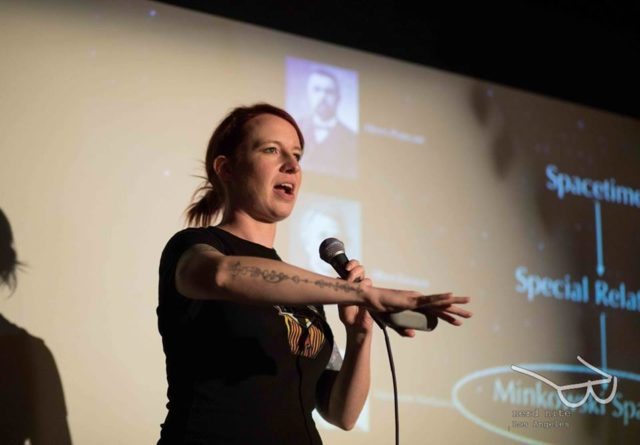
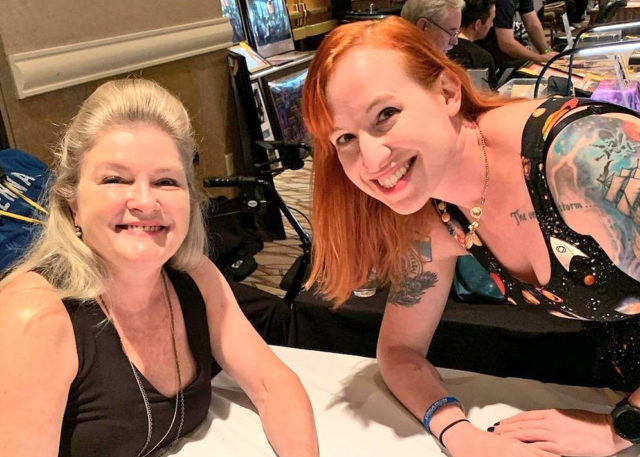
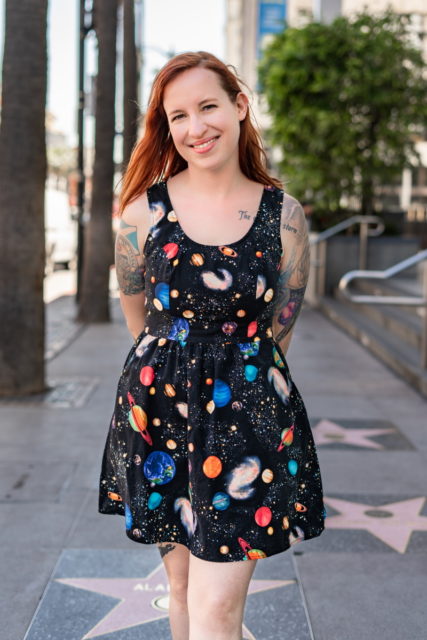
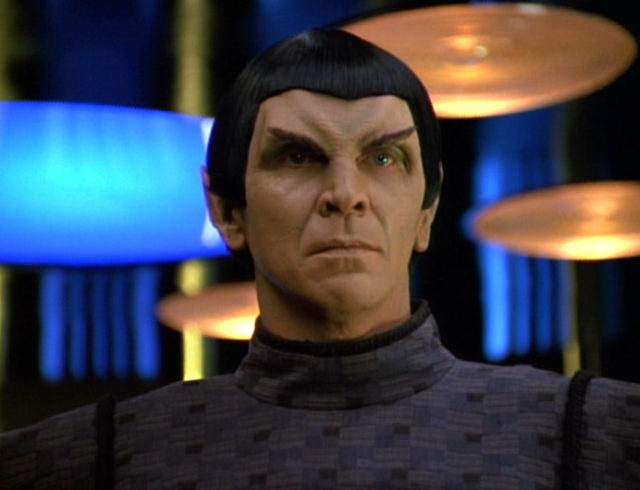
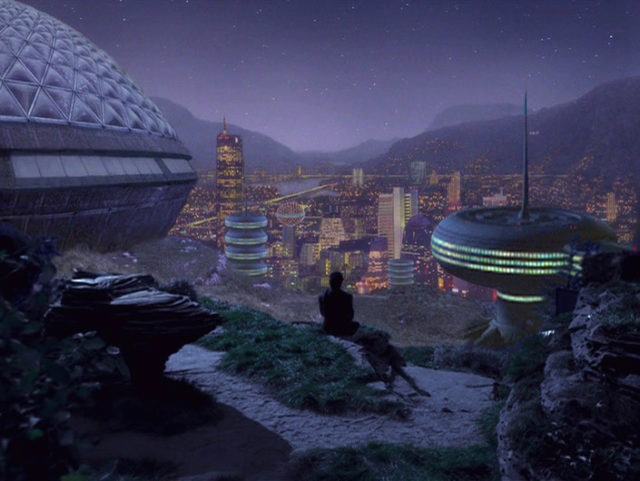
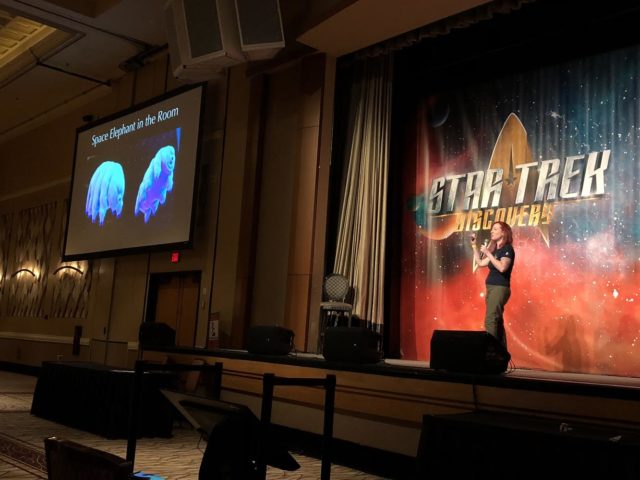
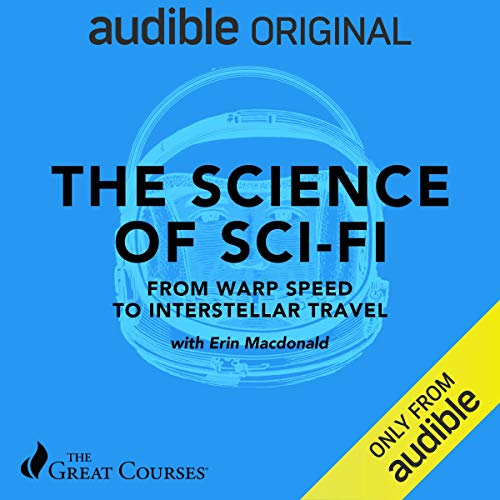

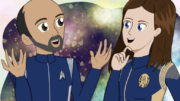
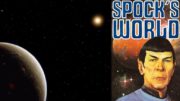

First comment boom
Congratulations Erin! Now please do away with those ridiculous roller coaster turbolift shots. Explain that there is simply no way a large void like that would exist within the confined shell of any starship.
I have to say, of all of the egregious liberties the Discovery team has taken with the visual continuity of the TOS era, those turbolift roller coasters is in my humble opinion among the very worst. I could almost tolerate it on the Discovery, but when they did the same thing on the Enterprise I lost it! Ha!
I think it could be because the 1701 was not yet filled and had modular internals. This is sort of what was described in Diane Carey’s Final Frontier when the “empress” (pre named Enterprise) was launched and really only had the bridge. Also explains the crew of 201 in the Cage vs. 400 in TOS. Chances are when we really build these ships building them big won’t be an issue given no need for pressure containment. Why all that is holding a lot of these massive asteroids is just a tiny bit of gravity (granted they don’t go to Warp speed, but to be honest if we accelerated them with Orion type nuclear pulse units at 1c acceleration I bet they’ll do fine if we put a big deuterium tank up front and reinforce the shell.
I am beginning to think they should have hired YOU as the tech consultant!
re: the internals … have you seen Ken Adam’s cutaway showing how the PLANET OF THE TITANS Enterprise was going to look like a cross between a French airport and a hamster habitrail, with diagonal tubes linking various compartments within a seemingly open space within the saucer? Hugely wasteful, but would have made for a pretty cool pullback shot.
Fans always have the most creative answers. Bravo, Cmd.!
Not really, Kevin Martin and FASAfan. Cmd. Bremmon would have been ideally suited for writing all the TNG technobabble. ; )
Hear hear!
I really like the more modern look of DSC, but those lifts and the enormous Engineering seen in Ask Not on the Enterprise is just a nono.
The ship has a certain size, respect that please.
Let’s lose the magic mushrooms and perpetual motion machine starships, eh?
Good for teaching science, good for story telling. Win, win.
Boom.
And honestly for those looking to watch some wagon train to the stars vs. dumb political analogies that don’t really line up anyway should we give up and watch the Expanse, Firefly and/or the new Lost in Space? I feel Trek 2009 tricked me into being pulled back in with the only redemption Admiral Cornwell and Pike/Number One/Spock/Michael Bernham with hints of TOS on that awesome 1701 bridge and Picard in a “look at that train go off a cliff” kind of way.
I actually stopped watching Star Trek Discovery because of the spore (fungi whatever ) drive. It’s not science I would teach a child or anyone else.
This was a GREAT interview! Thank you TM!
Her love for Star Trek is infectious. And I SO agree with her about Voyager and why I loved it, because it actually had the most science themed stories out of all the Star Trek shows IMO. I just loved all the wild ideas that went on that show moreso than any others. And both her favorite Voyager episodes “Blink of an Eye” and “Eye of the Needle” are both in my top 10 favorite Voyager episodes. Blink of a Eye my top 5. They both do what Star Trek does great, tell inventive stories with real science. We know Star Trek deals with mostly speculative science and yes even fantastical a lot of the times but when it aligns with real theory then its even better!
And I hope Discovery does more science episodes in the future. I loved the ones they did in season 2 and my guess is moreso in season 3 if the main story is science based (which it sounds like it is) and not just political/social.
But please DON’T overdo it like it was done in season 2 either. ;)
tiger… lol… wouldnt it be easier to passively enjoy it vs needing them to fulfill your specific wants and desires? it’s not like you landed on the amusement park planet :)
I been watching Star Trek for over 35 years now, I do that all the time. ;) But it’s nothing wrong to hope to see something that interests you either. But if its not included, no biggie, just as long what they DO present is good on its own. But this is a message board though, right? We’re here to give our own personal thoughts and interests as well.
Good lord, I think I may be in love.
I’d buy that audiobook even without that being the case, though!
She seems like a fantastic person but on a date call me Sheldon….
“I think Voyager had some scientific accuracy and great stories…”
I think I’d have to pay for the check and leave unless she had an amazing personality or we had some amazing conversations on astrophysics. LOL
For many it does. She stated two of the episodes DIRECTLY and gave actual scientific examples why. But stop acting like Star Trek is some franchise based on science facts. How scientific is it when the crew found Apollo on a planet lol. Star Trek is not a completely science based show by any means. Most of it relies on trippy and speculative science at best. But they do strive for real science some of the time. But NONE of these shows are based on scientific accuracy unless you think a Mirror Universe or a Nexus really exists.
Ha ha Yes, that’s true (science side, not the story side).
Mirror Universe however has some potential (quantum physics, dimensions).
But honestly the real science fun of Star Trek was the analog between our first starships and the first sailing ships, the Menagerie (what happens if aliens can create illusions / are we living in a simulation right now), first contacts, matter-anti matter engines, Doomsday Machines and the Wagon Train to the Stars (what are those first explorers far from home unable to contact Starfleet Command going to handle it with no resources representing all of humanity?). I think it’s no surprise the further they move away from this and the “easier” they make space travel the more Trek sucks.
I accept that this might not be new Trek anymore but Lost in Space or the Expanse. Hopefully she as a scientist recognizes even with an EM Drive, which probably doesn’t exist, space travel is going to be an energy intensive process probably with nuclear pulsed units and people that never see home again even with relativistic effects.
And that’s the beauty of Star Trek, it still can do those things if they want, but it does a lot of other things too lol. It’s not one or the other, never has been obviously. I do actually wish we will get a show with actual exploration again and just get there normally (for Star Trek I mean) without spore drives or transwarp tunnels lol. Hopefully that will come but I have no problem with what Picard or Discovery is doing either (I just want them to do it better ;)).
For me, you read enough of my posts to know I want things as diverse as possible. I love when Star Trek tries to grounds itself in real science, but I LOVE all the crazy weird anomaly stuff too, which is why I love Voyager because it did a lot that stuff just as much as bringing in real science whenever it could. The beauty of Star Trek is they both exists side by side.
That’s interesting, because this seems to be the hill I most often die on. I always quote David Gerrold as saying TWOK is about as scientifically accurate as the 1803 Farmer’s Almanac, and man, that is about as far as I can go with getting behind the non-science science in Trek. It works in that movie because you have a Genesis as a capper, but then when you spend a whole movie dealing with it, it completely unravels, and you have everything sounding like a fantasy novel, not remotely like science fiction. (stop spock aging – get him off the planet – why? the aging isn’t a virus he is being exposed to, it is part of the very process that reanimated him, it’s baked in!)
TUC has no science fiction content in it at all, it’s just ‘what if this ship had a capability the others don’t’ gimmick. In SF you’d be exploring all sorts of avenues about how this happened and all the various ramifications — like Cronenberg said just about teleportation when doing THE FLY — you’d need 9 hours or a miniseries to do the subject justice.
This last decade of Trek has ships come out of warp to a seeming dead stop, which, in addition to looking unintentionally funny (it works in DARK STAR, where it is deliberately funny), doesn’t take into account inherent velocity before entering warp — something that again has been at least addressed in various Trek novels by authors who have something going on up top.
As a country and world, we have (with some relatively massive exceptions, especially as of late), been creeping forward with our acceptance of science and scientific method, and that had seemed to even be seeping into entertainment in small ways (even a science-challenged show like FIREFLY — as I remember it, the opening voice-over for some episodes suggested they didn’t get the idea of what a galaxy was relative to a star system, and I never got the idea that all of this was happening in just one hugely populated star system till years after the show went off the air, and I’m still not sure if they always intended it that way — did the no-sound-in-space thing.)
You’d figured Trek could at least remain at station-keeping with respect to science, instead of just strip-mining science for the flashy high-concept parts, which seems to have been the case most of the time (do a Dyson Sphere story, but just use it as setup, don’t develop it properly … or in my case, when I pitched what sounded like a pretty outrageous notion that had some vague quality of scientific basis, have it dismissed as ‘we don’t do fantasy’ — when in fact that was pretty much all they do.)
Well that’s where the analogies come into play. Horatio Hornblower in space. Wagon Train to the Stars. To me that’s the real magic of “Star Trek” – the analogy that early space explorers will be like the sailing ships of old (which honestly, if we have interstellar explorers they probably will never see home again/be born in the star system they are to explore). On their own, needing resources, representing the entire “country” in first contacts, no backup from Starfleet Command, the fate of all the colonies on the commander. When they do that (ST:II TWOK) it works great. The “science” is that you have to do work, that there are hardships ahead. Entropy is ticking, you’ll never have enough energy to do all you want, and you really don’t know very much so learn, learn, learn. To me that is the real “science” and the more they move away from that the worse it gets.
That’s why TNG/VOY in my opinion sucks. It says everything is easy, we are oh so superior. Free energy. We can program life we are soooo smart and the universe is soooo easy!! The future is politics, how do we show that our politics are sooooo great that all aliens should agree with us.
DS9 succeeds in my opinion because it basically calls out TNG/VOY for being lazy. Technobabble is boring.
I watched TNG because it had STAR TREK in the name period, and quite frankly on realizing just how bad it was I am ashamed to say I wasted time on it. It distracts from reality that when you head out into the real world and realize even if ITER works you aren’t even going to be able to turn a turbine to generate power after billions spent your just amazed everything is so hard (and then you run off crying because the fantasy isn’t real).
But TOS embraced the hardness. It says forget the fantasies, develop some explosively pumped flux compression generator fusion devices and blow them up in water filled underground concrete chamber to turn a turbine with steam, there is your fusion power plant at 1/1000th the cost and it works. Then throw them behind a pusher plate and blast yourself to Titan where you can freeze in the pursuit of exploration and the frontier. Only the bravest lunatics will take that on but oh what a view you’ll have!
You have excellent taste!
They have had a science advisor???
“Well, it certainly doesn’t show.”
Have you like … read the interview?!
Seems like they only used the advice when it didn’t get in the way of their artists preconceived ideas.
It’s good they finally have a science adviser. Now all we need is a military adviser and some science fiction writers. :P
(But really, a proper sci-fi buff shouldn’t be mentioning “VOY: Blink of an Eye”, except perhaps to highlight the fact that it was an uncredited and unauthorized rip-off of a classic Robert Forward’s novel “Dragon’s Egg”.)
Good for her. However, if there’s a true love for the scientific aspect of Trek, please prove this in DIS/PIC etc as at present, the science is somewhat lacking/not quite adding up. Not just narratively, but visually. Just my humble opinion.
How fantastic that Star Trek now has a scientific advisor who also happens to be a huge fan and tries to keep the technology, science and lore together! That is so important for worldbuilding and she seems like the perfect choice :D
Well it’s about time!
Come on, it’s April Fool’s, they’d never hire a science consultant :)
Well I’m very jealous of her job as a consultant, but I’m happy for her and hope Kurtzman listens and follows her advice. Didn’t Roddenberry consult with the Rand Corporation during the beginning of Star Trek?
I’m pretty sure that is what gave us the super functional 1701 bridge where the Captain can read all the displays, talk to everyone, can’t get shot in the back… you know before furniture, making people stand unnecessarily for hours and having hard drives(?) on display came into fashion. Sometimes I think as an April Fools Joke it would be funny to have a frigate where everyone in the Combat Information Centre has to stand, see the response.
What’s the Vulcan script going down Erin’s arm say?
Ten bucks says they still have sound travelling through a vacuum. One of the most flagrant violations of all bad sci fi
I think I’m in love! She’s adorable & awesome.
Ummmm…why isn’t Kayla the Science Advisor???!!!
I long for the days when NASA titans like Dr. Jesco von Puttkamer were advising Trek on science! That said, tattooed frat girl fits right in with “magic mushrooms” and “time crystals” ;)